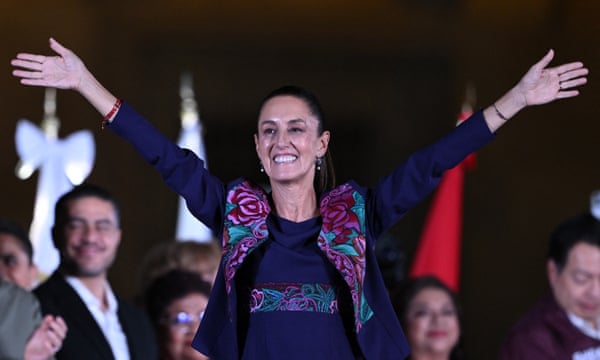"Informed AI News" is an AI-curated publications aggregation platform, ensuring you access only the most valuable information, with the aim of eliminating the information gap and transcending the confines of information cocoons. Find out more >>
Claudia Sheinbaum's Historic Win in Mexico: Implications and Challenges
- summary
- score

Mexico's Claudia Sheinbaum, a 61-year-old climate scientist, secured the presidency with a landslide 59.5% of the vote, becoming the nation's first female leader. Her party, Morena, is poised to achieve a supermajority in Congress, granting unprecedented legislative power, including the ability to amend the constitution without opposition.
Sheinbaum's victory builds on the populist policies of her predecessor, Andrés Manuel López Obrador (Amlo), who founded Morena and remains influential. Her mandate includes addressing persistent issues of violence, corruption, and the expanding role of the military in civilian affairs, which Amlo had escalated.
The election also marked significant gains for women in Mexican politics, with gender parity goals leading to a near-equal split of congressional seats and cabinet positions. This shift could influence policies on abortion rights and gender-based violence, areas where progress has been slow.
Internationally, Sheinbaum's administration will face complex dynamics, particularly with the U.S., given Mexico's role in trade, drug trafficking, and immigration. Her approach to these challenges will be closely watched, especially as the U.S. prepares for its own pivotal election.
In summary, Sheinbaum's historic win and the supermajority her party enjoys present both opportunities and formidable challenges for Mexico, domestically and in its foreign relations.
| Scores | Value | Explanation |
|---|---|---|
| Objectivity | 4 | Content attempts to balance different viewpoints, slightly leaning towards the success of Sheinbaum's party. |
| Social Impact | 5 | Content discusses significant political changes in Mexico, influencing public opinion. |
| Credibility | 5 | Content is credible, discussing factual political events with solid evidence. |
| Potential | 5 | Content has very high potential to influence future policies and international relations. |
| Practicality | 4 | Content is highly practical, discussing real-world political strategies and outcomes. |
| Entertainment Value | 3 | Content has some entertainment value due to its historical significance but is primarily informative. |